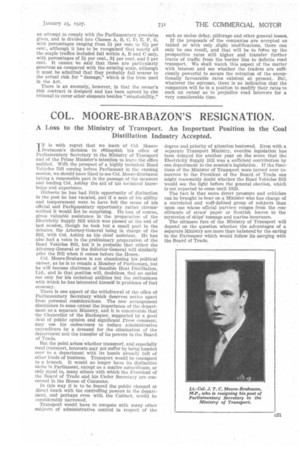COL. MOORE-BRABAZON'S RESIGNATION.
Page 55

If you've noticed an error in this article please click here to report it so we can fix it.
A Loss to the Ministry of Transport. An Important Position in the Coal Distillation Industry Accepted.
TT is with regret that we learn 'of Col. Moore.I.Brabazon's decision to rtlinquish his office of Parliamentary Secretary to the Ministry of Transport and of the Prime Minister's intention to leave the office unfilled. With the prospect of a highly technical Road Vehicles Bill coming before Parliament in the ensuing session, we should have liked to see Col. Moore-13rabazon taking a responsible part in the passage of the measure and lending Col. Ashley the aid of his technical knowledge and experience.
Hitherto he has had little opportunity of distinction in the post he has vacated, and if a man of his ability and temperament were to have felt the scope of his official and Parliamentary opportunity rather circurriL. scribed it would not be surprising. He has, of course, given valuable assistance in • the preparation of the Electricity Supply Bill which was passed at the end of last session, though he took but a small part in the debates, the Attorney-General being in charge of the Bill, with Col. Ashley as his chief assisiant. He has also had a voice in the preliminary preparation of the Road Vehicles Bill, but it is probable that either the Attorney-General or the Solicitor-General will similarly pilot the Bill when it comes before the House.
Col. Moore-Brabazon is not abandoning his political career, as he is to remain a Member of Parliament, but he will become chairman of Sensible Heat Distillation, Ltd., and in that position will, doubtless, find an outlet not only for his technical abilities but the enthusiasm with which he has interested himself in problems of fuel economy.
There is one aspect of the withdrawal of the office of Parliamentary Secretary which deserves notice apart from personal considerations. The new arrangement diminishes to some extent the importance of the department as a separate Ministry, and it is conceivable that the Chancellor of the Exchequer, supported by a good deal of public opinion and significant Press comment, may use his endeavours to reduce administrative expenditure by a demand for the elimination of the department and the transfer of its powers to the Board of Trade.
But the point arises whether transport, and especially road transport, interests may not suffer by being handed over to a department with its hands already full of other kinds of business. Transport would be consigned to a branch. It would no longer have its distinctive niche in Parliament, except as a matter subordinate, or only equal to, many others with which the President of the Board of Trade and his Under Secretary are concerned in the House of Commons.
In this way it is to be feared the public channel at direct touch with the controlling powers in the department, and perhaps even with the Cabinet, would be considerably narrowed.
Transport would have to compete with many other subjects of administrative control in respect of the degree and priority of attention bestowed. Even with a separate Transport Ministry, overdue legislation has been delayed for another year on the score that the Electricity Supply Bill was a sufficient contribution by one department to the session's legislation. If the functions of the Minister of Transport were turned over tomorrow to the President of the Board of Trade one might reasonably doubt whether the Road Vehicles Bill would see the light before the general election, which is not expected to come until 1929.
The fact is that more direct pressure and criticism can be brought to bear on a Minister who has charge of a correlated and well-defined group of subjects than upon one whose official purview ranges from the constituents of straw` paper or Scottish loaves to the mysteries of ships' tonnage and marine insurance.
The ultimate fate of the Ministry of Transport will depend on the question whether the advantages of a separate Ministry are more than balanced by the saving to the Exchequer which would follow its merging with the Board of Trade.












































































































